Learn how biblical family stories offer timeless wisdom on love, sacrifice, and forgiveness, revealing lessons vital for today's familial bonds.
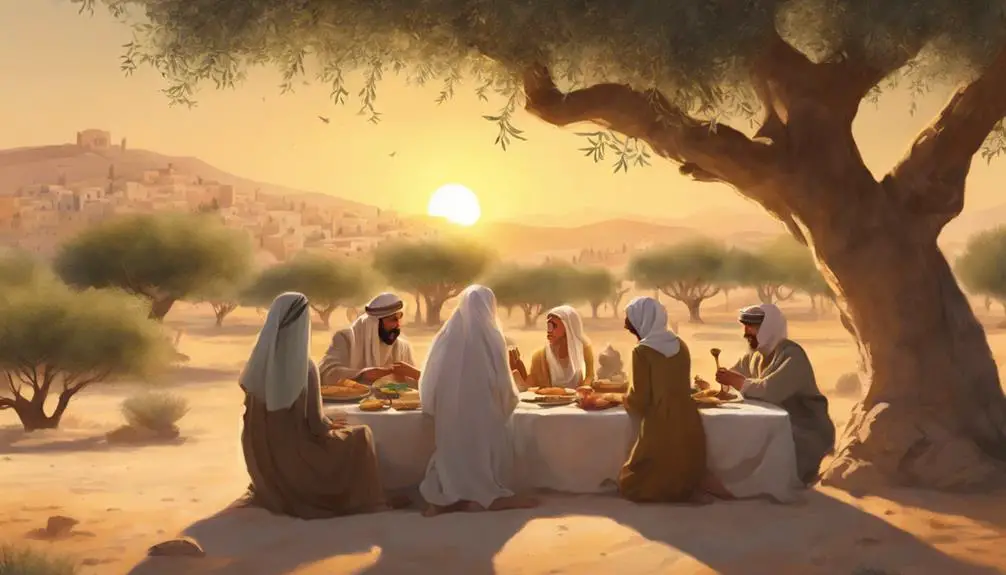
Story in the Bible About Family
Exploring biblical stories about family is like uncovering layers of an ancient manuscript; each layer offers new insights and wisdom.
You've probably heard of Adam and Eve or Noah's Ark, but have you considered their deeper implications on familial bonds and faith?
From Abraham's ultimate test of faith to Joseph's journey towards forgiveness, these narratives are not just historical accounts but lessons in loyalty, sacrifice, and love.
Let's embark on a journey to uncover how these timeless stories can still influence our understanding of family today.
You might find the reflections on these relationships more relevant to your modern life than you initially thought.
Key Takeaways
- Biblical stories often highlight the importance of family bonds and loyalty, as seen in Ruth and Naomi's relationship.
- Themes of forgiveness and transformation in family dynamics are central to Joseph's reunion with his brothers.
- Tests of faith and obedience within families can strengthen relationships, exemplified by Abraham's sacrifice.
- Stories like Noah's Ark underscore the resilience of families in the face of challenges, guided by obedience and divine intervention.
Adam and Eve: Origins

In the biblical narrative, Adam and Eve stand as the foundational figures from whom all human beings are said to descend, marking a pivotal moment in the Judeo-Christian creation story. Their emergence is central to the creation narrative, portraying the inception of human existence and the direct relationship between divinity and humanity. This account isn't merely a historical or mythological recounting but serves as a theological foundation, illustrating profound truths about human nature, divine intention, and the complex dynamics of obedience and disobedience.
Within this context, the concept of original sin emerges as a critical element. It's through Adam and Eve's act of disobedience—eating the forbidden fruit—that sin enters the world. This event delineates a fundamental aspect of human condition, emphasizing the innate propensity towards making choices that diverge from divine will. The narrative encapsulates a dual reality of human freedom and the consequential nature of actions, setting a precedent for themes of redemption and morality that permeate the biblical text.
Analyzing Adam and Eve's story, you're invited to reflect on the intricate interplay between divine sovereignty and human agency, and the perpetual human struggle between obedience and the lure of transgression.
Noah's Ark: Survival
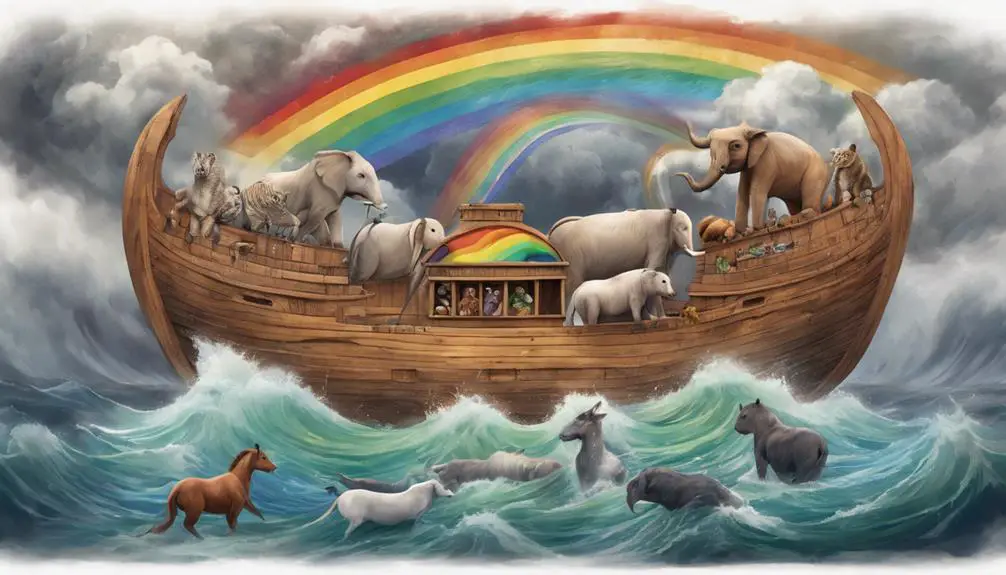
Reflecting on the dynamics of obedience and transgression in the narrative of Adam and Eve, we now turn our attention to the story of Noah's Ark, a compelling tale of survival amid divine judgment. This account not only highlights the themes of divine intervention and human resilience but also underscores the importance of family and collective survival in the face of existential threats.
Central to this narrative is the explicit demonstration of divine intervention, with God instructing Noah to build an ark in preparation for a catastrophic flood intended to purge the world of its pervasive wickedness. Noah's compliance with this directive serves as a pivotal example of faith and obedience, contrasting sharply with earlier instances of defiance against divine command.
Moreover, the inclusion of animal pairs in the ark symbolizes a broader theme of preservation and continuity of life. This detail not only underscores the importance of biodiversity but also reflects a divine mandate to maintain the balance and harmony of creation.
In essence, the story of Noah's Ark is an intricate exploration of survival, obedience, and the enduring bond between humanity, the divine, and the natural world. It presents a profound meditation on the capacity for renewal and redemption in the face of overwhelming adversity.
Abraham's Sacrifice: Faith
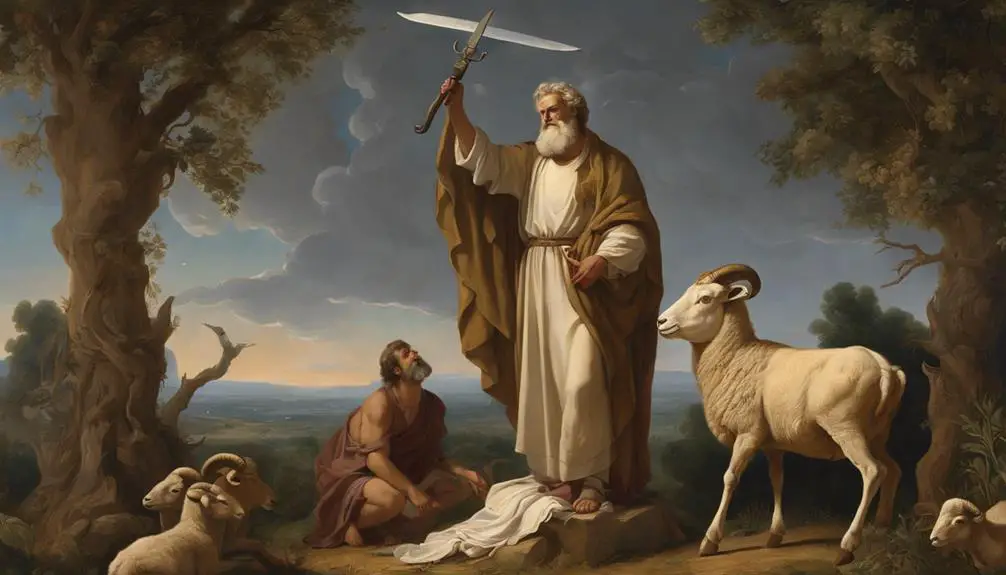
Transitioning from the narrative of Noah's Ark, we now explore Abraham's sacrifice, a story that starkly embodies the complexities of faith and obedience to divine will. This account, more than a mere episode, serves as a profound divine test, challenging Abraham's commitment and trust in God's promises. The obedience challenge presented to Abraham wasn't trivial; it demanded a willingness to sacrifice his son, Isaac, a request that seems to defy the very promises God had made to Abraham about his descendants.
Analyzing this story, you'll find that it isn't just about the act of sacrifice but rather the demonstration of unwavering faith in the face of incomprehensible demands. Abraham's readiness to obey, despite the personal cost, underscores a faith that transcends understanding. This narrative highlights a pivotal moment where divine command and human action intersect, revealing the depth of Abraham's faith and the nature of his relationship with God.
Moreover, the resolution of this test, with a ram provided as a substitute for Isaac, not only reaffirms God's provision but also enriches the concept of faith. Abraham's experience illustrates that faith, when coupled with obedience, leads to divine provision and fulfillment of promises, even when the path seems inscrutable.
Joseph's Reunion: Forgiveness
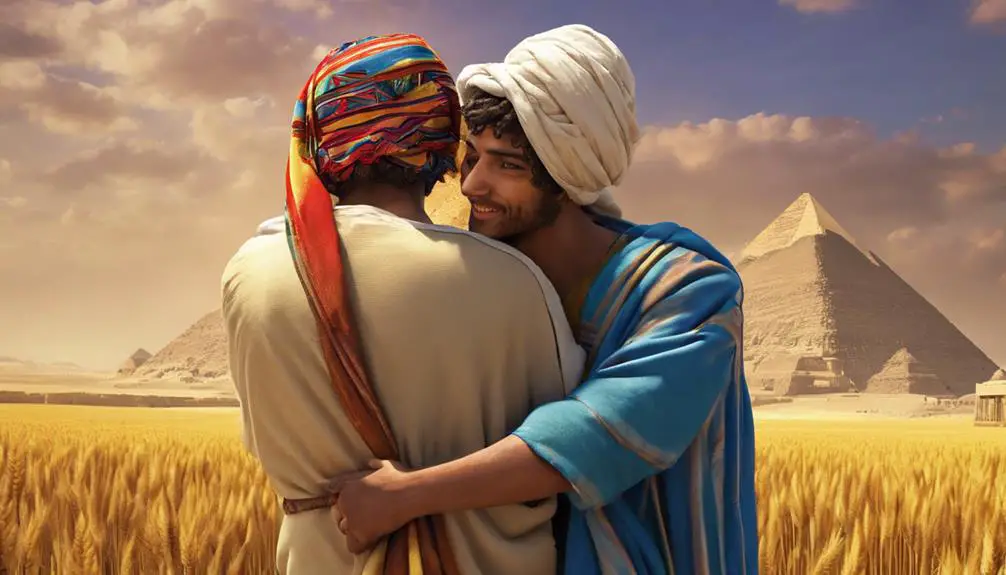
Delving into the story of Joseph's reunion, we encounter a profound exploration of forgiveness that challenges and transforms familial relationships. Initially, Joseph's ability in dream interpretation leads him from the depths of a dungeon to the heights of Egyptian governance, where he oversees grain storage, preparing for seven years of famine. This position not only places him at the center of economic prosperity but also sets the stage for a familial reconciliation that underscores the narrative's thematic richness.
Joseph's brothers, initially responsible for his suffering due to their jealousy and subsequent betrayal, travel to Egypt in search of sustenance, unknowingly placing themselves at the mercy of the brother they wronged. The tension peaks as Joseph confronts the dilemma of retribution versus reconciliation. His choice to forgive, stemming from a recognition of their shared bloodline and the divine orchestration of events, not only ensures their physical survival but also facilitates emotional healing.
This narrative arc illustrates forgiveness as a cornerstone of familial bonds, suggesting that economic prosperity and personal achievements pale in comparison to the reconciliation of broken relationships. Joseph's story, therefore, serves as a potent reminder of the transformative power of forgiveness within the family unit, offering a timeless lesson on the importance of overcoming past grievances to forge a united future.
Ruth and Naomi: Loyalty

Just as forgiveness serves as a foundation for familial restoration in Joseph's story, the narrative of Ruth and Naomi exemplifies unwavering loyalty as another pivotal element in sustaining family bonds. Through their journey, you observe the profound impact of women's roles and cross-cultural bonds within a biblical context, offering insights into the dynamics of family loyalty.
Aspect |
Ruth |
Naomi |
|---|---|---|
Loyalty |
Stays with Naomi despite hardship |
Encourages Ruth's new beginnings |
Women's Roles |
Redefines through bold actions |
Acts as a mentor to Ruth |
Cross-Cultural Bonds |
Embraces Naomi's culture |
Accepts Ruth, a Moabite, as family |
Ruth's decision to stay with Naomi, her mother-in-law, after the death of their husbands, transcends mere familial duty. It illustrates a commitment that challenges and redefines the expected roles of women in their society. Their story is not just about loyalty; it's a narrative that highlights the strength found in the bond between women from different cultures. Ruth and Naomi's relationship, marked by mutual respect and love, becomes a testament to the enduring nature of family ties, even those not bound by blood. This account serves as a powerful reminder of the capacity for loyalty to forge strong, lasting connections across cultural divides.
Frequently Asked Questions
How Do the Family Dynamics in the Stories of Cain and Abel, and Jacob and Esau, Compare in Terms of Sibling Rivalry and Its Resolutions?
You're exploring how sibling dynamics and resolution mechanisms in Cain and Abel, and Jacob and Esau, compare.
In both stories, sibling rivalry escalates due to favoritism and competition. However, their resolutions diverge: Cain's jealousy leads to irreversible harm, while Jacob and Esau eventually reconcile.
This contrast highlights the complexities of sibling relationships and suggests that resolutions can range from tragic to hopeful, depending on choices and circumstances.
What Lessons on Parenting Can Be Drawn From the Story of Lot and His Daughters, Considering It Is Not Covered in the Context of Survival or Faith?
You'll find that the story of Lot and his daughters teaches critical lessons on parenting, especially around setting moral boundaries and understanding generational consequences.
It's not just about survival or faith, but how the absence of clear guidance and ethical frameworks can lead to decisions with far-reaching impacts.
Analyzing this narrative, it's evident that parents play a crucial role in imparting values that shape their children's choices and future.
In the Story of David, Bathsheba, and Uriah, How Are the Consequences of Betrayal and Repentance Within a Family Explored Outside the Themes of Loyalty and Forgiveness?
In analyzing the narrative of David, Bathsheba, and Uriah, you'll find power dynamics at play, revealing the deep moral consequences of betrayal beyond loyalty and forgiveness.
This story exemplifies how individuals in positions of authority can misuse their power, leading to devastating outcomes for those around them.
Moreover, it delves into the complexity of repentance, showing that owning up to one's actions is crucial for personal and familial healing.
How Does the Story of the Prodigal Son Illustrate the Concept of Unconditional Love and Acceptance Within a Family, Beyond the Themes of Survival and Sacrifice?
In the Prodigal Son narrative, you'll find parental patience and the rediscovery of lost values as key elements illustrating unconditional love and acceptance.
Rather than focusing solely on survival and sacrifice, this story delves into how a family's bond withstands even the gravest mistakes.
It showcases how, through forgiveness and open-heartedness, relationships are mended, emphasizing that love within a family can overcome the deepest of rifts and guide one back to their roots.
Considering the Story of Tamar and Judah, How Are Issues of Justice and Righteousness Addressed Within Family Relationships, Outside the Context of Faith and Loyalty?
You'll find that the narrative of Tamar and Judah tackles issues of justice and righteousness within familial ties, focusing on social inheritance and gender roles.
It critically examines how societal norms and expectations influence family dynamics, particularly in relation to gender.
This story highlights the complexities and challenges of navigating these issues, while advocating for fairness and moral integrity, regardless of the individuals' roles or expectations imposed by their society.
Conclusion
In analyzing the biblical narratives of Adam and Eve, Noah's Ark, Abraham's sacrifice, Joseph's reunion, and the story of Ruth and Naomi, it's evident that family plays a pivotal role in conveying moral and theological lessons.
These stories underscore themes of origins, survival, faith, forgiveness, and loyalty within the familial context.
They serve as foundational texts that not only shape religious beliefs but also offer insights into the complexities and dynamics of family life in ancient times.

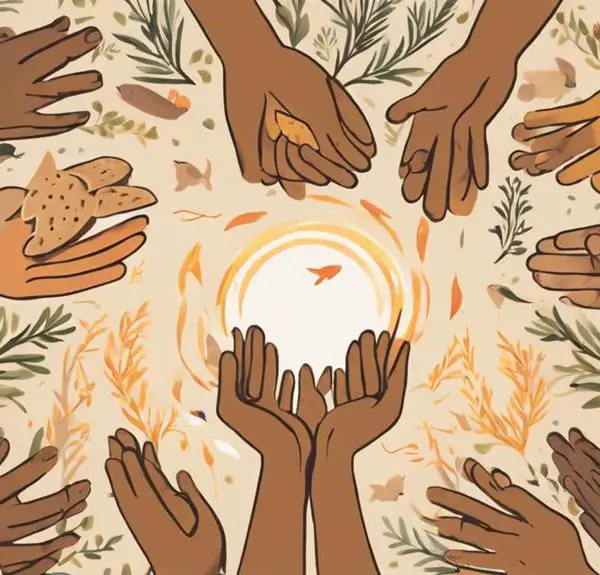
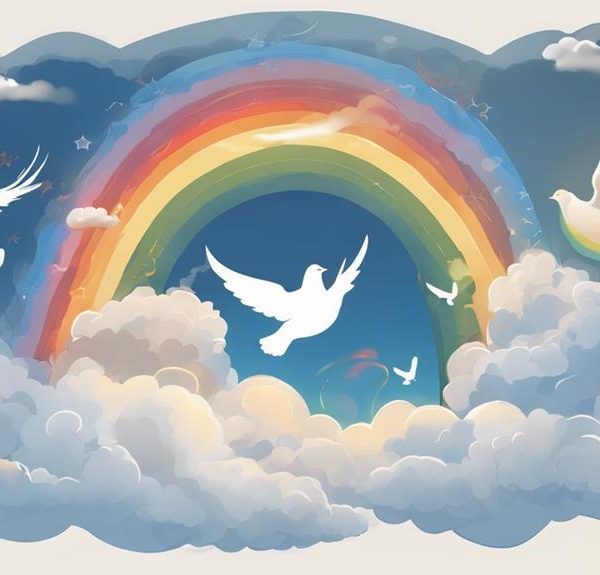
Sign up